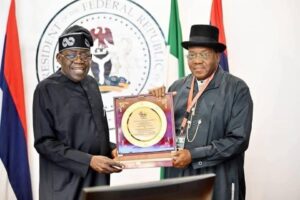Tinubu’s Engagement with PANDEF Signals Renewed Commitment to Niger Delta Peace
Headlinenews.news
President Bola Ahmed Tinubu’s recent engagement with the Pan Niger Delta Forum (PANDEF) has been widely regarded as a significant step toward fostering peace, stability, and sustainable development in the Niger Delta. The high-level meeting, which took place on March 11, 2025, at the State House in Abuja, brought together prominent South-South leaders, including traditional rulers, former governors, legislators, business leaders, and senior military officers.

However, the positive momentum generated by this engagement was overshadowed by controversial remarks made by the Minister of the Federal Capital Territory (FCT) and former Rivers State Governor, Chief Nyesom Wike. The minister’s comments, which directly disparaged PANDEF and its leadership, have sparked widespread criticism and raised concerns about their potential impact on ongoing peace efforts in the region.
Presidential Recognition of PANDEF’s Role in Regional Stability
During the meeting, President Tinubu formally acknowledged PANDEF as the foremost socio-cultural organization representing the Niger Delta. In a symbolic gesture of respect, the President paid tribute to the late Chief Edwin Clark, a revered elder statesman and former PANDEF leader, by observing a minute of silence in his honor. This recognition reinforced PANDEF’s role as a critical stakeholder in addressing the region’s political and developmental challenges.

Key issues discussed at the meeting included:
The need to sustain peace in Rivers State through ongoing reconciliation efforts.
Presidential assent to the South-South Development Commission (SSDC) Bill to ensure equitable development.
Infrastructure development, particularly road networks and port expansion.
Resolution of socio-economic challenges affecting Bakassi crisis victims.
Greater inclusion of South-South indigenes in Nigeria’s oil and gas sector governance.
Environmental remediation in oil-producing states.
Continued advocacy for federal restructuring and equitable resource distribution.
President Tinubu’s assurances of action on these issues were seen as a renewed commitment to addressing the long-standing concerns of the region. His endorsement of PANDEF’s mediatory efforts in Rivers State, where political tensions persist, was particularly significant.

Wike’s Controversial Remarks and the Fallout
In a development that has drawn widespread condemnation, Minister Nyesom Wike, in a media interview on March 12, 2025, dismissed PANDEF as “the worst organization ever” and accused its members of visiting the Presidential Villa for personal financial gain. These comments were not only unfounded but also appeared to undermine the credibility of an organization that has played a crucial role in advocating for the Niger Delta’s interests.
Of particular concern was Wike’s disparaging reference to esteemed South-South figures, including the late Chief Edwin Clark and His Majesty King Alfred Diete-Spiff, a former Military Governor of Rivers State and current Chairman of PANDEF’s Board of Trustees. Given that these individuals were honored by the President just a day earlier, Wike’s remarks were viewed as highly inappropriate and detrimental to the unity of the region.

PANDEF’s Response and Call for Accountability
PANDEF has strongly condemned Wike’s statements, describing them as “unwarranted and disrespectful.” The organization has called on President Tinubu to intervene and urge the minister to retract his comments and issue a public apology.
Furthermore, PANDEF expressed concern over Wike’s continued refusal to engage with its Peace and Reconciliation Committee, which has been actively working to mediate the Rivers State crisis. While Rivers State Governor Siminalayi Fubara has shown a willingness to collaborate with the committee, Wike’s lack of cooperation is seen as a major obstacle to resolving political tensions in the state.

The Broader Implications for the Niger Delta
The Niger Delta remains a region of strategic importance to Nigeria, given its contributions to the country’s oil and gas sector. However, unresolved political tensions and developmental challenges continue to hinder progress. President Tinubu’s recent engagement with PANDEF provided renewed hope for constructive federal intervention.
Nonetheless, Wike’s remarks have introduced an unnecessary distraction at a time when unity and collaboration are essential. Analysts argue that such rhetoric, especially from a high-ranking federal official, risks undermining ongoing peace efforts and could strain relations between the federal government and regional stakeholders.
As PANDEF continues its advocacy and mediation efforts, the focus now shifts to how the Tinubu administration will navigate these emerging tensions. The President’s next steps will be crucial in determining whether this renewed engagement with the Niger Delta leads to tangible progress or if political divisions will overshadow efforts for regional stability.

Dr. G. Fraser. MFR




